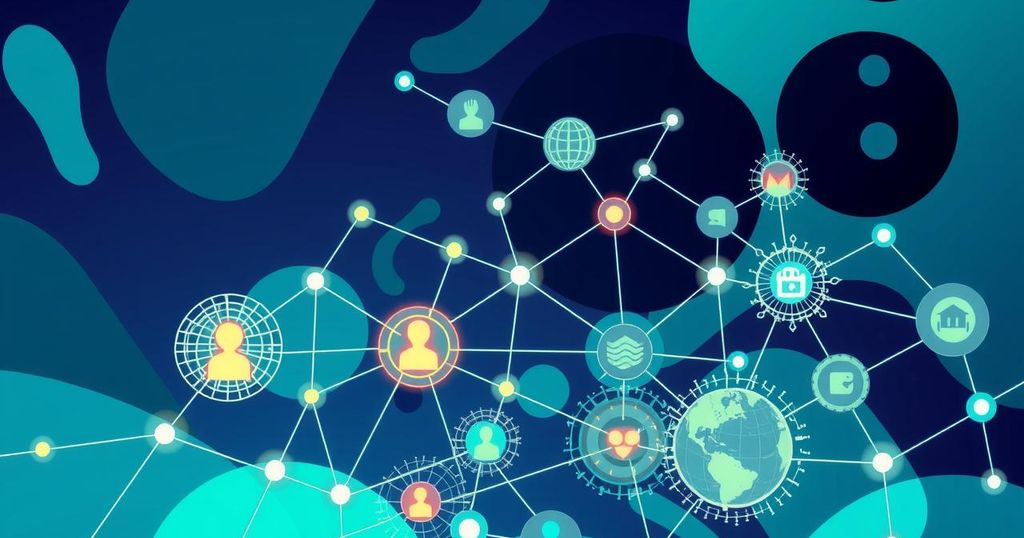Why AI Development Needs a Decolonial Perspective
The article discusses the pressing need for decolonial studies in artificial intelligence (AI) development. It highlights how current AI systems disproportionately benefit citizens in the Global North while further marginalizing those in the Global South. Scholars emphasize the importance of recognizing biases in data and the hidden labor from the Global South that supports AI operations, advocating for more inclusive practices in AI development to rectify historical inequalities.
Artificial intelligence, or AI, is changing the global landscape in ways many are still trying to comprehend. However, as Payal Arora, a noted scholar in data and AI studies explains, the reality is starkly divided. The influence of AI seems to lean heavily in favor of citizens in the Global North, where laws are more liberal and protective, while those in the Global South face a myriad of legislative obstacles that limit their access to these cutting-edge technologies.
Delving deeper into AI systems reveals something unsettling. Currently, the datasets that power these systems often originate from relatively small populations in the Global North. Scholars like Lisa Gitelman and Antoinette Rouvroy argue that the notion of “raw” or unbiased data is a myth — every dataset is inevitably contextualized for specific purposes, often aligning with Western viewpoints.
This preference for data derived from European and North American cultures contributes to an emerging type of colonialism. Nick Couldry and Ulises Mejias point out how data colonialism exploits human life in the name of profit, transforming data into a commodity much like traditional colonial resources. This new approach mirrors past extraction practices, but now it’s our behaviors and information that are harvested.
Since the advent of tools like ChatGPT, AI’s rapid rise has incited a whirlwind of regulatory and societal questions. The ChatGPT explosion has sparked debate over AI’s ethical impact, its relation to human culture, and how it reshapes identity. Experts agree, we’re only scratching the surface regarding AI’s influence on decolonial studies which we desperately need to address.
In a world still carrying echoes of colonial ideology, it’s crucial to recognize how AI is constructed on these historical foundations. Walter Mignolo’s insights into decoloniality serve as a timely reminder of the need to confront Western assumptions around knowledge and the power structures that dictate our understanding of AI.
Moreover, the imposition of AI systems often overlooks Indigenous Knowledge Systems (IKS), which contain centuries of cultural wisdom. The prevalent AI models perpetuate a Eurocentric vantage point, sidelining diverse worldviews and further complicating the path toward genuinely inclusive technology.
Mignolo argues that coloniality underpins modernity, and similarly, AI’s pitfalls reflect systemic inequities in global infrastructure. It’s striking to consider that the training data for these systems frequently skews toward white individuals, leading to crises like racially biased facial recognition software — where black individuals are misidentified or inaccurately represented by algorithms.
And beneath the shiny exterior of AI innovation lies a troubling reality. Human labor, especially from the Global South, keeps these systems operational, often without recognition or adequate compensation. Reports surfaced earlier this year alleging that OpenAI had outsourced harmful content moderation tasks to workers in Kenya, who faced psychological trauma while earning meager wages.
This cycle isn’t a one-off glitch, it’s embedded within the business model. Much like colonial practices of resource extraction, our current AI framework extracts emotional and cognitive labor from underprivileged populations without fair restitution. The rising trend of “microwork” has people in many regions, including economically-strained places like Venezuela, settling for minimal wages just to survive.
AI systems cannot claim neutrality; they mirror the societies that build them. The idea that algorithms can be isolated from human biases is a fallacy. Historical data underpins AI, and when that data is flawed, it reflects broader societal inequities. When asked for an image of an “Indian,” generative AI often churns out stereotypes that miss the richness of culture, feeding into harmful generalizations.
As governments rush to lead in AI technology, policies mold how AI is created and handled. Despite the noble rhetoric about ethics, the beneficiaries of these advancements often remain the same— those with historical privileges. As Mignolo highlights, coloniality extends beyond simple economics; it’s about who controls knowledge and who has a voice in this digital age.
If AI is to truly serve a complete global community, there’s a clear demand to dismantle deep-seated inequalities inherent in its production. It’s time to acknowledge the labor that fuels AI, to amplify diverse perspectives, especially those from the Global South, capable of challenging the status quo. Until we confront the colonial dimensions intertwined with AI, its promises of equity and prosperity will likely, regretfully, remain confined to a select few.
In summary, the article emphasizes the pressing need for decolonial studies to address inherent biases within AI technologies. As AI becomes more entrenched in our lives, recognizing and dismantling colonial frameworks in data and technology is crucial. Without this, the benefits of AI will remain unequally distributed, perpetuating historical inequalities rather than bridging them. To create an equitable digital future, the voices and knowledge from the Global South must be acknowledged and integrated into the conversation about AI’s evolution and governance.
Original Source: www.fairobserver.com




Post Comment